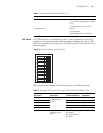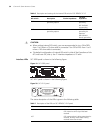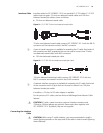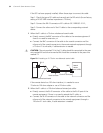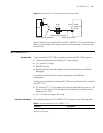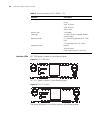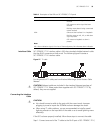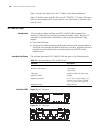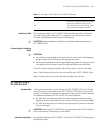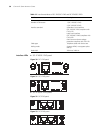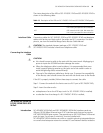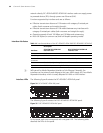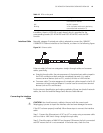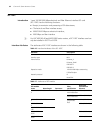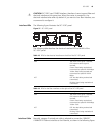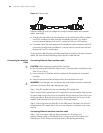
SIC-1FXS/SIC-1FXO & SIC-2FXS/SIC-2FXO 37
Interface Cable The connection cables for SIC-1AM/SIC-2AM are telephone cables with ferrite
core. Both ends of the cables are RJ11 connectors. For cable pinouts, refer to
Low-End and Mid-Range Series Routers Cable Manual.
c
CAUTION: Relevant cables are included in the standard shipment package of
SIC-1AM/SIC-2AM.
Connecting the Interface
Cable
c
CAUTION:
■ You should connect a cable to the port with the correct mark. Misplugging is
prone to impair the SIC/MIM and even damage the router.
■ You are recommended to install a special lightning arrester on the input end of
the telephone line in order to avoid the lightning effects more efficiently.
If the SIC has been properly installed, follow these steps to connect the cable:
Step 1: Insert the end with ferrite core into one LINE port of SIC-1AM/SIC-2AM;
Step 2: Plug the other end of the cable into the telephone wall jack;
SIC-1FXS/SIC-1FXO &
SIC-2FXS/SIC-2FXO
Introduction 1/2-port voice subscriber circuit interface card (SIC-1FXS/SIC-2FXS) and 1/2-port
voice AT0 analog trunk interface card (SIC-1FXO/SIC-2FXO) serve to access and
handle 1/2 channel(s) of analog voice signals over data communication networks.
The differences between SIC-FXS and SIC-FXO are listed below:
■ SIC-FXS cards are analog subscriber line cards that provide ordinary analog
telephone and fax access and also can connect AT0 loop trunks of exchanges;
■ SIC-FXO cards are loop trunk cards that provide access of common subscriber
lines of exchanges.
c
CAUTION: While using SIC-FXS/SIC-FXO, you must ensure that the H3C Routers
can be connected to IP networks or other WANs.
Interface Attributes The interface attributes of SIC-1FXS/SIC-1FXO and SIC-2FXS/SIC-2FXO are given in
the following table:
Table 11 Description of the LEDs on SIC-1AM/SIC-2AM panel
LED Description
LINK OFF means the link is idle. ON means the
connection has been established. Blinking
means the connection is being set up.
ACT OFF means the link is idle. Blinking means
data is being transmitted or received.



